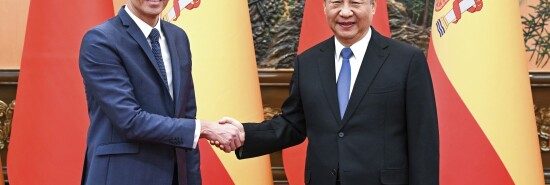
China reminds Europe that obedience is the cost of profit
Tom Rogan
Meeting Xi Jinping in Beijing on Friday, Spanish Prime Minister Pedro Sanchez was reminded that his political obedience is the price he must pay for China’s beneficence. There could be no more stark contrast between this form of feudal mercantilism and the U.S. vision for an international order centered on relatively free trade and capitalist competition.
As Beijing’s propaganda newspaper Global Times put it, Xi “stressed that Europe should maintain strategic independence when dealing with relations with China.” A Communist apparatchik explained that Xi’s meeting with Sanchez “also reminds Europe to walk in the same direction as China.” In a separate editorial, the newspaper added that when it comes to EU-China relations, “their common interests far outweigh the divergences. This fundamental aspect should be recognized in Europe’s ‘strategic autonomy.'”
Here we see Beijing’s familiar play to French President Emmanuel Macron’s “strategic autonomy” doctrine. That doctrine seeks to situate the EU’s foreign policy in distinct separation from the traditional trans-Atlantic alliance. China thus loves the doctrine, as it excuses EU deference toward Beijing as serving some broader if undefined strategic purpose. (As his indecipherable comments on Taiwan attest, even Macron cannot define it.)
So far, the EU has refused to leverage its relations with Beijing in order to get Xi to put pressure on Russia to end the war in Ukraine — the most significant challenge since 1945 to European territorial integrity, the EU’s raison d’etre. And it’s not as if the EU lacks leverage. In 2022, the EU imported a stunning $672 billion in goods from China, a figure nearly three times higher than its exports to China. The issue is that the EU cares more about short-term trade than it does about its long-term security and values.
THE GRAVE STUPIDITY OF ABANDONING SAUDI ARABIA TO CHINA
And boy, does Xi know it.
The Global Times emphasized this point by asserting that “the blossoming of China-Europe relations requires both sides to meet each other half way.” This meeting “half way” language is a partner to China’s “win-win cooperation” rhetoric. But the effective translation, again well understood by EU leaders, is that the EU must remain submissive on China’s priority concerns (Taiwan, Hong Kong, the South China Sea, human rights, technology transfers) as long as it wants preferential investment and trade.
Beijing is keen to show what will happen to EU leaders who take a stand to the contrary.
For allowing Taiwan to establish an office with “Taiwanese” in its title, Lithuania has suffered a vicious Chinese trade embargo. And the Netherlands raised China’s ire by jointly imposing U.S. export restrictions on high-tech manufacturing systems. This drew a warning from Beijing’s ambassador that “China will not swallow everything. When damage occurs, we must take action to protect ourselves. I’m not going to speculate on what that might be. [But] it won’t stop with just harsh words.”
Underlining “strategic autonomy’s” paper-thin pretense, the EU’s collective response to these assaults on its members’ sovereign interests has been rather weak. Indeed, a much-vaunted EU trade coercion tool introduced just this week is riddled with bureaucratic inertia and offers only a modicum of future potential.
For the U.S., then, the lesson is clear. EU leaders have the right to pursue whatever foreign policy they choose. But Republican presidential hopefuls must carefully assess whether America’s historic allies remain America’s closest allies.
